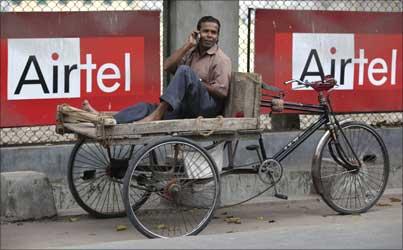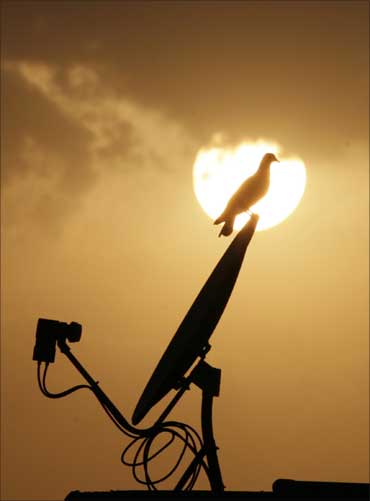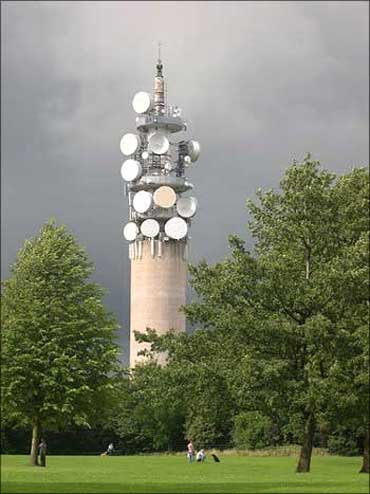 | « Back to article | Print this article |
Why telcos are crying foul over Trai proposals
The pricing of spectrum continues to haunt telecom companies.
While the telecom ministry's decision to sell 2G spectrum in 2008 to nine new companies at 2001 prices snowballed into a major controversy, with the opposition parties alleging a scam that cost the government Rs 60,000 crore (Rs 600 billion), the Telecom Regulatory Authority of India's recommendations on spectrum fees have added fuel to the fire.
Terming Trai's recommendations on spectrum allocation and pricing as 'retrograde and arbitrary', Bharti Airtel and other GSM operators have lashed out against the regulator.
The Telecom Regulatory Authority of India said GSM and CDMA operators with more than 6.2 megahertz (MHz) and 5 MHz of second-generation bandwidth, respectively, pay a one-time fee to keep the excess spectrum. The fee will be linked to the ongoing 3G spectrum auctions.
If implemented, this will be a big blow to GSM players like Bharti Airtel and Idea that have well over 6.2 Mhz of spectrum and will have to cough up more to retain the additional radio waves.
UBS estimates Bharti would need to pay about Rs 8,690 crore (Rs 86.90 billion), while Idea would need to shell out Rs 2,820 crore (Rs 28.20 billion) for the excess spectrum the companies hold.
Trai expects to raise Rs 30,000-35,000 crore (Rs 300-350 billion) as one-time spectrum charges from these operators.
Besides, hitting the telcos hard, the Trai move is slated to make telecom services costly in India. Trai estimates the number of mobile subscribers in India to be 1 billion by 2014-15 and the spectrum requirement in next five years to be 500-800 MHz.
Operators feel policies may benefit only select operators, which will halt the growth of the world's fastest growing telecom market.
Click NEXT to read further...Why telcos are crying foul over Trai proposals
Trai has capped the spectrum allotment to GSM and CDMA mobile companies at 10 Mhz and 7 Mhz per operator, respectively.
Trai has fixed spectrum usage fees at 0.5 per cent of revenue for spectrum up to 6.2 Mhz. Beyond 6.2 Mhz, a fee of 1 per cent of the operator's revenue will be charged.
Trai has pegged the value of the 900 Mhz spectrum band at 1.5 times that of the 1,800 Mhz spectrum band used for CDMA services. Trai has also favoured sharing of 2G spectrum between operators for five years if the rules are passed.
Trai said telcos should not be given free spectrum when their licences come up for renewal, but must pay market rates based on 3G prices.
Operators will have to pay for the entire spectrum they hold after 20 years when it is time for the licence renewal. So Bharti and Vodafone will be forced to pay about Rs 20,000 crore (Rs 200 billion) in the next 4-6 years.
There is a cap on the maximum spectrum a single operator can hold at 8 Mhz in each circle and up to 10 Mhz in metros.
The recommendations of Trai have to be accepted by the telecom ministry before they become law. Trai wants future allocations of 2G spectrum benchmarked against the price of 3G frequencies.
Click NEXT to read further...
Why telcos are crying foul over Trai proposals
Reliance Communications is the only company that supported Trai's new regulations, calling it 'progressive and consumer-centric'.
Operators who have already been given start up spectrum and are awaiting additional allocation will get priority, a move that will benefit operators like Reliance Communication.
Vodafone said Trai has failed to 'redress the discrimination' between those who hold GSM spectrum and the dual-technology operators, terming the proposals 'grossly and unfairly' discriminatory.
'The latest recommendations overturn all existing policies of the DoT of the last 15 years, recommendations made by various government committees and even Trai's own earlier recommendations,' said Bharti Airtel.
Tata Teleservices said the recommendations did not address the inequalities in spectrum allocation.
Telecom stocks have crashed in the last 3 days on concerns that this could hit the earnings of top telecom operators, which are already witnessing a rise in capital expenditure due to the ongoing 3G auctions.
Click NEXT to read further...
Why telcos are crying foul over Trai proposals
Increasing competition, lower margins, substantial cash outflows and all-time low tariffs have already taken a toll on the telecom companies' profits.
The latest Trai recommendations, if implemented, will increase Bharti's financial liablility, as it already has a $9-billion loan to repay, which it had taken for Zain Telecom's Africa assets.
'It seems that the recommendations are designed to punish efficient and performing operators like us for contributing to the growth of Indian telecom sector and are instead tailor made to benefit select operators whose contribution to telecom growth and government revenues have been negligible,' said Bharti Airtel.
'Over the years, operators like us have brought services at the lowest tariffs in the world to the door steps of the common man and connected 85 per cent of India's population, including 440,000 villages,' it said.
'We have invested over Rs 70,000 crore (Rs 700 billion) to build networks and services and have contributed thousand of crores to the exchequer in the form of licence, spectrum fee and other levies. In terms of spectrum charges, we have contributed up to 10 times more per Mhz than many other operators,' said Bharti, a company with a subscriber base of over 100 million.
"We are confident that the DoT and the government will take a rational approach and summarily reject these arbitrary, impractical and perverse recommendations," it said.
Click NEXT to read further...
Why telcos are crying foul over Trai proposals
The big three players -- Bharti Airtel, Vodafone and BSNL -- hold around 10 Mhz spectrum in many key circles. The blow also came for many new mobile licencees, including Tata, Uninor and Videocon, who are yet to receive any start-up spectrum in many circles, including Delhi.
There are many telcos who are yet to get start-up spectrum for any circle. Trai also said preference would be given to those who want to get the contracted 6.2 Mhz of spectrum and those who are waiting for the next level (8 Mhz of spectrum).
However, there is good news for new players as Trai has lifted the three-year ban for selling promoter's equity. New operators will get up to 6.2 Mhz without any additional fee provided they meet rollout obligations.
Meanwhile, the revenue from the 3G spectrum sale touched a whopping Rs 58,416 crore (Rs 584.16 billion) with the bid for a national third generation mobile licence hitting Rs 14,446 crore (Rs 144.46 billion) on Day 28 of the auction on Wednesday.
Click NEXT to read further...
Why telcos are crying foul over Trai proposals
There are 15 operators and 584 million mobile phone users in India. Currently, additional radio airwaves for mobile firms are granted when they reach prescribed subscriber-addition milestones, with only a usage fee charged for the resource.
All top mobile operators, including Bharti, Vodafone, Idea and Reliance, have got huge spectrum based on their reported subscriber figures.But this will change if Trai's proposal is implemented. The regulator suggests that subscriber-linked criteria should be done away with for additional spectrum.
It favoured the assignment of spectrum with fulfilment of roll-out obligations, which should be complete within three years from the date of assignment of radio waves.





